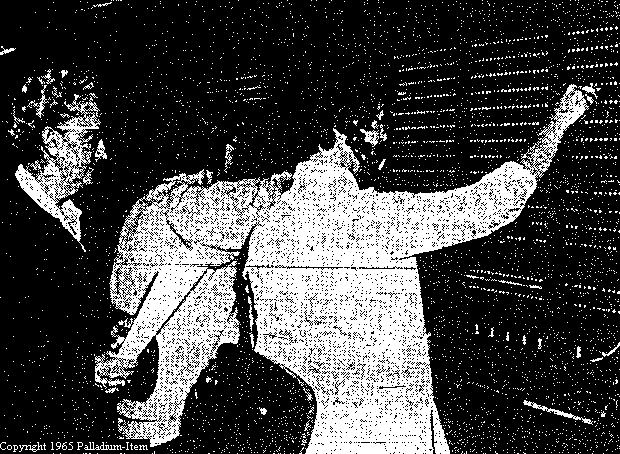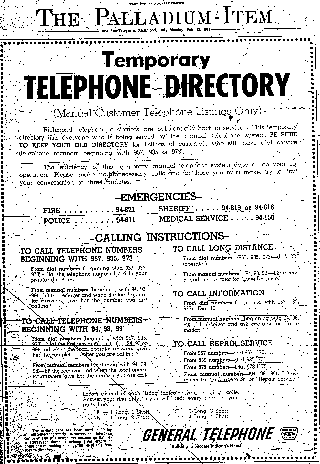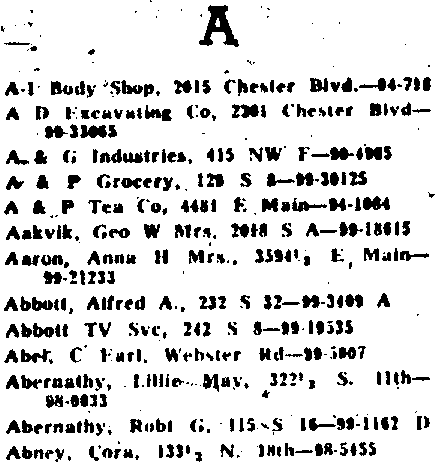General Telephone Co.,
Richmond Indiana Fire
February 4, 1965
Thanks to ghg for posting the full page gifs of microfilm copies of the Palladium-Item and to the Palladium-Item for allowing their reprint on the web. This archive contains Palladium-Item stories and photos pertaining to the Richmond, IN., General Telephone Co. fire of February 4th, 1965.
All text and pictures Copyright 1965 Palladium-Item (Richmond, Ind., USA)
February 11, 1965 -
New Phone Switchboard Used; 934 Of 13,000 Lines Restored
Use of the 28-position switchboard rushed here from Illinois over the past week started Thursday noon at the General Telephone Corporation of Indiana's Richmond office to provide further impetus to the job of restoring telephone service to this community.
W.P. Rigdon, Richmond manager, said that not all the 28 positions can be manned immediately but it, as the rest of the job, will be progressive from day to day.
Either Sunday, Feb. 21, or Monday, Feb 22, are still target dates, for providing manual service for the 70 per cent of the phone service which was knocked out by fire last Thursday.
As of 10 a.m. Thursday, manual service had been provided for 934 customers out of a total of about 13,000 which must use that type of telephone facility until automatic dialing eventually is restored,
As more lines are tied in, the users are notified by phone. This could happen day or night.
What use can be made of this manual phone service?
Explanation Given
Rigdon explained it this way.
Calls can be made to an operator who can then make local calls to any other local phones in service, or long distance calls.
"Lift the receiver and wait for an operator. Don't touch the dial. Normally an operator would answer within a few seconds but right now, under an abnormal load and limited capacity, it mat even be a few minutes. We ask that the users be patient." Rigdon said.
The "emergency only" restriction was still on, both for local and long distance calls, but Rigdon said that perhaps even later in the day that restriction might be eased as more use is made of the big multiple position board.
Under the manual setup, numbers being called are rung by the operator only once. A long ring is given.
"I have heard some customers say that they have heard their phone ring but since it rang only once, and not a second time, they didn't answer it. By all means, when the phone rings, answer it," Rigdon said.
New Directory On Way
A new directory is being published because all manual phones will have new numbers. Until the formal publication can be completed, numbers will be listed in a tabloid section Monday in this newspaper. It will have to be kept in mind, however, that all numbers listed will not by then be in use, although assignments have been made.
Meanwhile, a force of nearly 300 men and women, from as far away as California and Florida, representing General Telephone and other cooperating companies, continues the round-the-clock job. They are from about 12 to 15 states. Trucks and other equipment are much in evidence. The municipal parking lot on North Tenth has been given over to them.
As the job of providing temporary service pushed ahead, telephone executives report trained are looking to the time when automatic dialing can be returned.
W.C. Rowland, operating vice-president of General Telephone of Indiana, and J.B. (Bud) Christensen, chief engineer, returned Thursday from North Lake, Ill., where they conferred with Automatic Electric and, concerning the status of new dialing equipment.
"We are encouraged at the progress made. Equipment will be shipped 2,000 lines at a time and installed and made working as it arrives rather than make an instantaneous, complete switchover. This phase will move more rapidly than we thought," Rigdon said. No time target has been established, however.
Salvage Dropped
The job of cleaning smoke damaged switches has been given up in favor of getting new equipment, a course believed swifter, Latest types will be obtained.
Some original automatic numbers will have to be changed, but it appears at this moment that most business numbers will remain the same when automatic dialing is ultimately restored. Direct Distance Dialing, (DDD), operator recently put into effect, will be resumed.
The building which was the scene of the disastrous fire just a week ago was being vacated of office furniture which is being stored. A huge vanload went out Thursday morning.
Indiana Bell has been on the job since the outbreak of the fire and still has technicians here restoring additional long distance circuits and to help make emergency switchboards workable.
Indiana Bell responded before the fire was extinguished, sending emergency switchboards which were set up in General's garage to re-establish Richmond's voice contact with distant cities. The first circuits between Richmond and Indianapolis were working within three hours after firemen left the scene.
The switchboard equipment supplied by Indiana Bell is working as long distance equipment. Switchboards sent in by General itself and restriction Bell System companies are being connected for local service use.
Bell Equipment Spared
The fire missed Indiana Bell's long distance terminal equipment which was in a separate room in General's building but the cable leading to it was burned and some power was lost.
Indiana Bell splicers and PBX installers from Indianapolis, Muncie and New Castle came to Richmond to help restore the long distance facilities. Circuits now are working between here and Indianapolis, New Castle, Chicago, Cincinatti, Muncie and Anderson and additional lines are in the works, including some to Dayton.
Subscribers in the three unaffected substations, with numbers starting with 957, 973 and 935, were given this special information:
(1) Starting at 2:01 a.m. Friday, Feb. 12, if you have an emergency situation, dial "94" and the local operator will assist you.
(2) If you wish to call long distance, dial "0" (operator).
(3) Continue to dial any numbers beginning with 957, 973, and 935 as you have been.
(4) On Monday, Feb. 15, you will receive a new directory with numbers being established for customers who have been out of service. All these numbers are scheduled to be in service by Feb. 21, at which time you will be able to call them.
Radio Telephone Service Restored To Local Users
Authority to use a second radiotelephone channel in Richmond has been asked by Richmond Radiotelephone, Inc.
Ramsey McDonald, president, said Thursday he has submitted the request to the Federal Communications Commission (FCC) in order to relieve the local communications problem.
He stated that additional equipment could be obtained within two weeks, if the FCC approval is granted. Only essential business, and physicians would be permitted to use the facilities.
Full service was restored to the firm's subscribers Tuesday, five days after the General Telephone Company switchroom fire. Remote control lines to the regular base station of Radiotelephone, Inc., were lost in the fire.
Standby base station facilities were used with FCC approval.
Training Of Operators In Use Of Manual Switchboards Pushed At Phone Company
 Miss Billie Wright, left, General Telephone's general traffic training instructor, is on the oh-so-busy scene teaching operators the intricacies of manual switchboard operation.
Miss Billie Wright, left, General Telephone's general traffic training instructor, is on the oh-so-busy scene teaching operators the intricacies of manual switchboard operation.
Who needs to go to outer space for a view of something unbelieveable?
A gander behind the scenes at General Telephone Co. these days is an awesome sight, one that leaves the visitor speechless.
One of the gigantic tasks, maybe downright colossal, is facing a diminutive woman from General's Fort Wayne headquarters, Miss Billie Wright.
It's her job to train some 70 women in the fine art of operating manual switchboards.
Miss Wright is familiar with all types of switchboards in her position as general traffic training instructor. ("Traffic" in telephone lingo means the traffic of calls in and out of a switchboard.)
The majority of telephone operators in the Richmond area, however, are not familiar with the "cord," or manual switchboard in which the operator actually makes the connection between caller and the person called.
When people can dial their own calls, a "cord board" is not necessary. The recent telephone fire put most dial phones out of order, so manual service is now a must.
"It's not difficult to learn manual operation," Miss Wright said, "but it takes practice to acquire dexterity and speed."
And not only must the women learn from scratch how to operate the manual boards, they must learn how to handle calls on three variations of this type of switchboard.
3 Boards Functioning
Three different boards, imported from Detroit, Antioch, Ill., and Wakarusa, Ind., are functioning. The operators will be working on all three, Miss Wright explained.
Comedians are fond of humorizing the harried switchboard operator, who unintentionally or otherwise, gets cords twisted, and tangled as she blissfully connects all the wrong people on calls.
Miss Wright has been training operators through the day and night since Saturday to make sure this doesn't happen in Richmond.
She said she is also "instructing instructors to instruct," so she does have some help on the tremendous task. "Operators will be working as they team," she said. Special classes will also be held for supervisors.
In addition to learning all about the equipment, how to answer calls, how to ring equipment, the women must learn special color-codes which tell her immediately the status of each line, whether it is working, a number has been changed, or whether there actually is an assigned number.
May Get 2 Operators
Sometimes operators will be asked by two different operators what number they are calling, Miss Wright explained. This will happen when customers call someone whose number is on one of the other two switchboards in use.
Calls placed to former private line users, who will have four party service instead, will have special rings which operators must also learn. This involves knowing which customer gets one long-one short and which gets one short-one long!
"We are training as fast as possible but intend to maintain a good quality of service at the same time," Miss Wright said.
Answering calls within 10 seconds is the goal, she added.
Watching the operators in a flourish of action made it evident their speed in knowing which way increases as they become "accustomed to the pace."
One humorous sign posted on a switchboard warned, "Don't Rush Me . . . My Get Up and Go Got Up and Went!"
If Miss Wright and 70-plus General Telephone operators have anything to say about it, that "get up and go" is going full speed ahead for a speedy, voice-with-a-smile service in Richmond!
February 14, 1965 -
Manual Telephone Service By Monday!
All Lines Are To Be Restored, But Emergency Rule Still Holds
As around-the-clock efforts continued Saturday to restore at least emergency telephone service here, these were the developments:
As of Saturday morning more than 2,500 phones had been tied in the manual service.
By Sunday morning the number will be nearly 10,000.
By Monday morning all 13,000 customers cut off by fire Thursday, Feb. 4, will have emergency service. That is a week earlier than had been anticipated.
But according to W.P. Rigdon, Richmond manager for General Telephone of Indiana, here is the rub:
"The phones are being tied into the manual system so quickly that it is impossible to notify each customer to verify it. This job may last until the middle of the week."
As a result, although all will have emergency service by Monday, some will not be aware of it immediately.
"The biggest difficulty in setting up the manual service is in checking the ringing apparatus so that incoming calls can be received. We know that by Monday everyone will be able to call out," Rigdon said.
The "emergency only" restriction is still on "as much as we regret it," Rigdon said. But he said at least persons will be able to summon help.
New Numbers will replace those beginning 962, 966 and 969. They will be published in this newspaper Monday.
Numbers starting with 935, 973, or 957 will be unchanged. They are in the substation areas unaffected by fire except to limit calling between those areas.
The latter group includes about 3,000 customers. There are some 16,000 customers in all involving about 26,000 telephones.
Still Using Radio
Emergency radio service remains in effect for incoming long distance calls which cannot be handled through which the person called can be notified.
Rigdon said no one is any more numbers than he is that the manual emergency service being set up is "not good."
Although private lines are being restored for doctors, businesses, industrial and business switchboards, those residences which have been on private lines will get 4 party line service.
One of the undesirable features will be that on any given set of four phones, all will ring when any of the four is called. But coded rings will be assigned so that at least the customer will know whether or not the phone is for him.
"We know that will be irritating. It will be one of the first things eliminated when new automated dialing equipment is installed. Some of it already is on the way," Rigdon said.
A phone which has been on a party line in the past will remain on that system but will ring, as it has, only when the call is for that particular phone.
Billing will be on the basis of the type of service provided so at least bills will be smaller.
To Be Gradual
Rigdon indicated it probably will be "well into the summer," however, before all manual service disappears. It will be on a progressive scale rather than an all system cutover.
Richmond has not had manual service since 1907 when the city's 2,342 manual telephones were changed over to an automatic dialing system.
Meanwhile, training of switchboard operators continues. There aren't that many manual exchanges left.
Operators put out of work when Direct Distance Dialing (DDD) went into effect last year have been recalled and others are being trained, mostly from the Richmond area.
The big switchboard from Illinois has places for 28 operators. If each position was filled and each operator worked 8 hours, that would mean 84 operators, to say nothing of relief help and supervisory help.
There are in addition two smaller boards, including one in a huge trailer in the alley sent down by Michigan Bell.
Meanwhile, General Telephone's office in Fort Wayne Saturday said that when service is restored businessmen will find it cheaper to make long distance calls. The company announced it would join American Telephone and Telegraph in new interstate rate reductions.
Effective April 1, station-to-station calls anywhere in the United States may be made during the day for $2 maximum for three minutes. Present costs of such calls is $2.25.
Rate reductions from 5 to 25 cents are scheduled for the first three minute charge for all daytime interstate station-to-station calls of 601 miles or more.



Text transcribed by James E. Bellaire - All material remains Copyright 1965 Palladium-Item
 Miss Billie Wright, left, General Telephone's general traffic training instructor, is on the oh-so-busy scene teaching operators the intricacies of manual switchboard operation.
Miss Billie Wright, left, General Telephone's general traffic training instructor, is on the oh-so-busy scene teaching operators the intricacies of manual switchboard operation.

